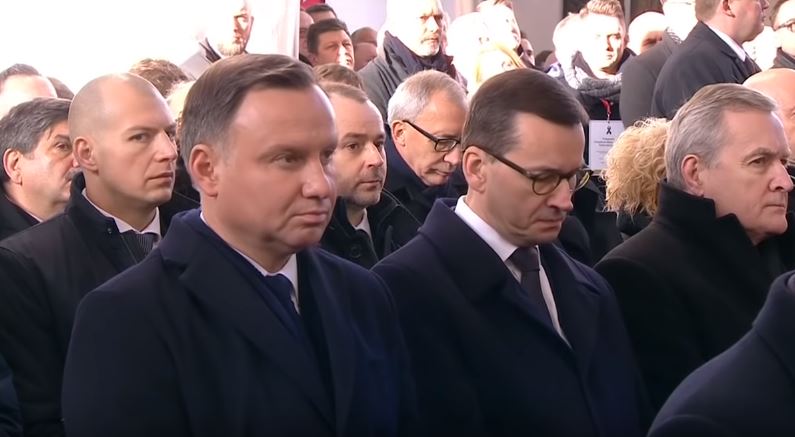World
Poland Mayor’s Murder Exposes Deep Divides in the Country, yet unites Gdansk

GDANSK – The assassination of Poland’s Mayor, Pawel Adamowicz has brought a significant change in the political history of Poland. People from the different corners of divided Poland appeared to attend the Mayor’s funeral. Seeing the accumulation of a huge number of people on the streets around the ancient brick church in the old city, one could expect a new change in Poland’s political scenario. The national elections are going to take place in the coming time so this assassination could potentially affect the entire equation in Poland.
“The polarization in Poland is absolutely horrifying,” said Antoni Dudek, a conservative political scientist at Cardinal Stefan Wyszynski University in Warsaw. Also, other people anticipated the change in the political world of Poland. “This is an extraordinary time for all of us,” said Aleksander Hall, an academic and close friend of Mr. Adamowicz’s. “I believe that Pawel’s death will change people in a more permanent way — people are becoming more aware of what hate speech can do and hopefully many will no longer tolerate such aggression.”

The assassination of mayor took place while he was speaking on-stage at a fund-raiser which was organized by the Great Orchestra of Christmas Charity on Sunday night. With the facility of burial insurance, his dead body was buried by following all the necessary rituals. Police have arrested the assailant and termed him mentally disturbed. After stabbing the mayor on the stage, the 27-year-old assailant shouted about her past history. He said that the mayor was a member of the previous national government led by Civic Platform. The officials said that the assailant has a criminal record and he had involved in acts of violence in the past. However, the real motive of the killer is yet not known and people are considering it as a case of political conspiracy.
After this killing, the air in the political environment of Poland would get affected. People who gathered for the mayor’s funeral might consider the hand of the opposition party behind this murder. One thing is sure that the growing aggression in Poland would consequently make its impact in the national elections in the near future. Although Adamowicz’s death reflects the divide in Poland, still it has resulted in the unification of Gdansk.
World
TRG Chairman Khaishgi and CEO Aslam implicated in $150 million fraud

In a scathing 52-page decision, the Sindh High Court has found that TRG Pakistan’s management was acting fraudulently and that Bermuda-based Greentree Holdings historic and prospective purchase of TRG shares were illegal, fraudulent and oppressive.
The Sindh High Court has further directed TRGP to immediately hold board elections that have been overdue and illegally withheld by the existing board since January 14, 2025.
In the landmark ruling, the Sindh High Court has blocked the attempted takeover of TRG Pakistan Limited by Greentree Holdings, declaring that the shares acquired by Greentree, nearly 30% of TRG’s stock, were unlawfully financed using TRG’s funds in violation of Section 86(2) of the Companies Act 2017.
“Having concluded that the affairs of TRGP are being conducted in an unlawful and fraudulent manner and in a manner oppressive to members such as the Petitioner (Zia Chishti), the case falls for corrective orders under sub-section (2) of section 286 of the Companies Act,” Justice Adnan Iqbal Chaudhry concluded.
The case was brought by TRGP former CEO and founder Pakistani-American technology entrepreneur Zia Chishti against TRG Pakistan, its associate TRG International and TRG International’s wholly-owned shell company Greentree Limited. In addition, the case named AKD Securities for managing Greentree’s illegal tender offer as well as various regulators requiring that they act to perform their regulatory duties.
The case centred around the dispute that shell company Greentree Limited was fraudulently using TRG Pakistan’s own funds to purchase TRG Pakistan’s shares in order to give control to Zia Chishti’s former partners Mohammed Khaishgi, Hasnain Aslam and Pinebridge Investments.
According to the case facts, the Chairman of TRG Pakistan Mohammed Khaishgi and the CEO of TRG Pakistan Hasnain Aslam masterminded the $150 million fraud. They did so together with Hong Kong based fund manager Pinebridge who has two nominees on TRG Pakistan’s board, Mr. John Leone and Mr. Patrick McGinnis.
According to the court papers, Khaishgi, Aslam, Leone, and McGinnis set up a shell company called Greentree which they secretly controlled and from which they started buying up shares of TRG Pakistan. The fraud was that Greentree was using TRG Pakistan’s funds itself. The idea was to give Khaishgi, Aslam, Leone, and McGinnis control over TRG Pakistan even though they owned less than 1% of the company, lawyers of the petitioner told the court.
This was all part of a broader battle for control over TRG Pakistan that is raging between Khaishgi, Aslam, Leone, and McGinnis on one side and TRG Pakistan founder Zia Chishti on the other side. Zia Chishti has been trying to retake control of TRG Pakistan after he was forced to resign in 2021 based on sexual misconduct allegations made by a former employee of his. This year those allegations were shown to be without basis in litigation that Chishti launched in the United Kingdom against The Telegraph newspaper which had printed the allegations. The Telegraph was forced to apologize for 13 separate articles it published about Chishti and paid him damages and legal costs.
After Chishti resigned in 2021, Khaishgi, Aslam, Leone, and McGinnis moved to take total control over TRG Pakistan and its various subsidiaries including TRG International and to block out Chishti. The Sindh High Court’s ruling today has reversed that effort, ruling the scheme fraudulent, illegal, and oppressive.
It now appears that Zia Chishti will take control of TRG Pakistan in short order when elections are called. He and his family are now the largest shareholders with over 30% interest. He is closely followed by companies related to Jahangir Siddiqui & Company which have over a 20% interest. The result appears to be a complete vindication for Zia Chishti and damning for his rivals Aslam, Khaishgi, Leone, and McGinnis who have been ruled to have been conducting a fraud.
TRG Pakistan’s share price declined by over 8% on the news on heavy volume. Market experts say that this was because the tender offer at Rs 75 was gone and that now shares would trade closer to their natural value. Presently the shares are trading at Rs 59 per share.
According to the court ruling, since 2021, shell company Greentree had purchased approximately 30% of TRG shares using $80 million of TRG’s own money, which means that that the directors of TRG Pakistan allowed company assets to be funneled through offshore affiliates TRG International and Greentree for acquiring TRG’s shares – a move deemed both fraudulent and oppressive to minority shareholders. The Sindh High Court also found illegal Greentree’s further attempt to purchase another 35% of TRG shares using another $70 million of TRG’s money in a tender offer.
The ruling is a major victory for the tech entrepreneur Zia Chishti against his former partners and the legal ruling paves the way for him to take control of TRG in a few weeks.
-

 Tech4 years ago
Tech4 years agoEffuel Reviews (2021) – Effuel ECO OBD2 Saves Fuel, and Reduce Gas Cost? Effuel Customer Reviews
-

 Tech6 years ago
Tech6 years agoBosch Power Tools India Launches ‘Cordless Matlab Bosch’ Campaign to Demonstrate the Power of Cordless
-

 Lifestyle6 years ago
Lifestyle6 years agoCatholic Cases App brings Church’s Moral Teachings to Androids and iPhones
-

 Lifestyle4 years ago
Lifestyle4 years agoEast Side Hype x Billionaire Boys Club. Hottest New Streetwear Releases in Utah.
-

 Tech7 years ago
Tech7 years agoCloud Buyers & Investors to Profit in the Future
-

 Lifestyle5 years ago
Lifestyle5 years agoThe Midas of Cosmetic Dermatology: Dr. Simon Ourian
-

 Health6 years ago
Health6 years agoCBDistillery Review: Is it a scam?
-

 Entertainment6 years ago
Entertainment6 years agoAvengers Endgame now Available on 123Movies for Download & Streaming for Free
